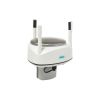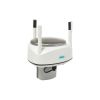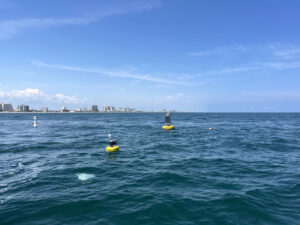Vaisala WXT535 Multi-Parameter Weather Sensor
Features
- Low power consumption is ideal for battery powered systems
- No moving parts for durability and long maintenance intervals
- Easy integration with 3rd party data collection platforms
- Free ground shipping
- Expedited repair and warranty service
- Lifetime technical support
- More
Flexibility
The Vaisala WXT530 series of weather instruments observe six of the most important weather parameters, which are air pressure, temperature, humidity, rainfall, wind speed and direction through various combinations. Select the transmitter with the needed parameter(s) for specific weather applications, with a large variety of digital communication modes and wide range of voltages. There is a heated option available to keep sensors clear of snow and ice. Low power consumption enables solar panel applications. The Vaisala WXT530 Series focuses on maintenance-free operations in a cost-effective manner. The Vaisala WXT535 Multi-Parameter Weather Sensor simultaneously measures air temperature, humidity, pressure and rainfall in a compact platform with optional heating.
Integration
The series offers analog input options for additional third party analog sensors. With the help of the built in analog to digital converters, the Weather Transmitter WXT530 turns into a small, cost effective weather parameter hub. Additional parameters include the solar radiation and external temperature sensor. The analog mA output option for wind speed and direction enables a wide variety of industrial applications. The WXT530 exceeds IEC60945 maritime standards.
Solid Performance
Ultrasonic Vaisala WINDCAP Sensors are applied to determine horizontal wind speed and direction. Barometric pressure, temperature, and humidity measurements are combined in the PTU module using capacitive measurement for each parameter. The module is easy to change without making contact with the sensors. The precipitation measurement is based on the unique acoustic Vaisala RAINCAP Sensor without flooding, clogging, wetting, and evaporation losses.
In The News
Data-Driven Advocacy on the Lower Deschutes River
Like many freshwater environments, the Deschutes River in Oregon is under pressure from development, pollution, and climate change. Many rivers, streams and lakes in the Deschutes Basin do not meet Oregon water quality standards –where state water quality monitoring assesses levels of bacteria, pH, dissolved oxygen, temperature, and fine sediment. Hannah Camel is the Water Quality Coordinator for the Deschutes River Alliance (DRA), a non-profit organization that focuses on the health of the lower 100 miles of the Deschutes River–the area most affected by human intervention. As a data-driven organization, the DRA has benefited from the installation of two NexSens X2 data loggers.
Read MoreExpanding the Port Everglades: Real-Time Monitoring of Water Quality Conditions from Planned Dredging Operation
The Port Everglades in Broward County, Florida, serves large trade vessels and cruiseliners and incoming and outgoing recreational boaters. However, as cargo ships become larger, the port must expand. A dredging project led by the US Army Corps of Engineers will substantially deepen and widen the port's navigation channel to accommodate larger Panamax cargo ships and modern cruise liners. As a result of this project, a large amount of sediment will be displaced into the water column. This suspended sediment may settle outside of the project area, burying benthic organisms like corals, and possibly carrying harmful particulates to other regions. [caption id="attachment_39497" align="aligncenter" width="2560"] A CB-950 and CB-25 deployed on site at Port Everglades.
Read MoreIt’s Time to React to Water Quality: Proteus Multiparameter Probe aboard NexSens Buoy
Water quality monitoring is essential for safeguarding public health, protecting ecosystems, and ensuring the sustainability of water resources. Contaminants such as industrial pollutants, agricultural runoff, and sewage discharge can severely impact aquatic life and pose serious risks to human health if left unchecked. Traditionally, water quality monitoring has been a slow and labor-intensive process, requiring samples to be collected, transported to a lab, and analyzed—a process that can take days. However, with the advancement of real-time sensor technology, environmental agencies, researchers, and industries can now monitor water quality instantly.
Read More
























